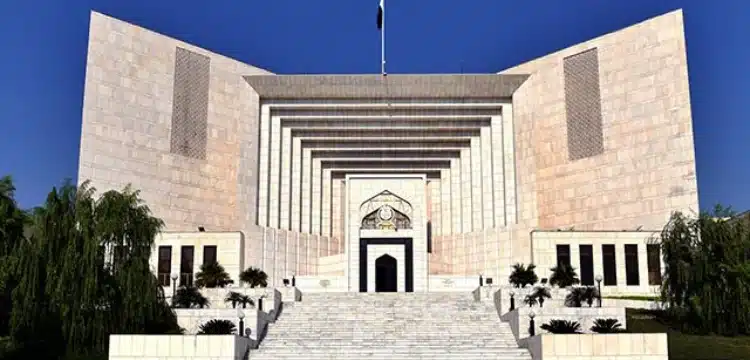[vc_row][vc_column][vc_column_text dp_text_size=”size-4″]The Supreme Court (SC) of Pakistan has made a significant decision by declaring the Supreme Court (Review of Judgments and Orders) Act 2023 unconstitutional, effectively striking down a law that sought to expand the scope of review petitions. This decision was made by a three-member SC bench, led by Chief Justice of Pakistan Umar Ata Bandial, and has far-reaching implications for the legal and judicial landscape of the country.
The Act in question, passed in 2023, aimed to bring about changes to the process of review petitions in the Supreme Court. It sought to broaden the scope of cases that could be reviewed, potentially allowing for a reexamination of certain judgments and orders that had been previously finalized. However, this move was met with opposition and raised concerns about its compatibility with the Constitution.
Chief Justice Umar Ata Bandial, heading the bench, expressed the view that the Act was “repugnant to and ultra vires the Constitution.” This strong language underscores the court’s conviction that the Act went beyond the boundaries set by the Constitution and infringed upon the powers of the Supreme Court. The bench highlighted the importance of preserving the separation of powers and the sanctity of the Constitution itself.
Also Read: Supreme Court Declares 2023 Review Act Unconstitutional
The heart of the matter lies in the question of whether the Act encroached upon the jurisdiction of the Supreme Court. The bench emphasized that the Act attempted to create a new form of appellate jurisdiction that was not supported by the Constitution. In essence, the Act aimed to introduce changes to the review process that were not within the purview of the legislative branch. Such a move would have potentially shifted the balance of power between the judiciary and the legislature.
The Supreme Court’s decision is grounded in the principle that any attempt to interfere with the scope of the court’s powers, particularly its review jurisdiction, would be both erroneous and unconstitutional. The review jurisdiction is a critical aspect of the judicial process, allowing for the correction of errors and the rectification of injustices that may have occurred in the lower courts. However, this power must be exercised within the framework set by the Constitution to ensure a proper separation of powers.
The court’s judgment emphasizes that the Act’s attempt to establish a new form of appellate jurisdiction without constitutional authorization is a breach of the foundational principles of the legal system. This ruling reinforces the notion that only a constitutional amendment can modify the review jurisdiction of the Supreme Court. In this way, the court is reaffirming its commitment to upholding the Constitution as the supreme law of the land.
The decision has significant implications not only for the legal community but also for the broader public. It underscores the importance of respecting the boundaries established by the Constitution and the need to safeguard the independence of the judiciary. The judiciary plays a crucial role in upholding the rule of law and ensuring that the rights of citizens are protected.
This decision also serves as a reminder of the checks and balances that are integral to a democratic system. The separation of powers between the three branches of government—executive, legislative, and judicial—is designed to prevent any one branch from accumulating excessive power. The Supreme Court’s decision in this case reinforces its role as a guardian of the Constitution and a check on potential overreach by the legislature.
In conclusion, the Supreme Court’s declaration of the Supreme Court (Review of Judgments and Orders) Act 2023 as unconstitutional is a significant development in the legal landscape of Pakistan. The decision underscores the importance of upholding the Constitution and respecting the boundaries of power established by it. It also serves as a reminder of the judiciary’s role in maintaining the rule of law and ensuring the proper functioning of a democratic system. As Pakistan continues to navigate its legal and political challenges, this decision sets an important precedent for the future.[/vc_column_text][/vc_column][/vc_row]











